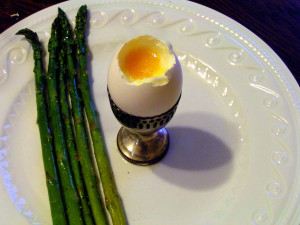In the past you may have heard the phrase ‘go to work on an egg’; but then came the salmonella scare and what about cholesterol?! There have been many conflicting messages in the media so I understand the confusion.

What is the current advice?
There is no recommended limit on how many eggs people should eat. Eggs are a good choice as part of a healthy balanced diet but it’s a good idea to eat as varied a diet as possible.[1]
Nutritional content
Eggs are a good source of protein and the fat-soluble vitamins A and D and provides some vitamin E. Eggs are a source of all the B vitamins. It is a particularly rich source of vitamins B12 and riboflavin (vitamin B2) and a useful source of folate. Eggs contain many of the minerals that the human body requires for health. In particular eggs are an excellent source of iodine (required to make the thyroid hormone), and selenium, an important antioxidant. The egg is a significant source of phosphorus, required for bone health, and provides some zinc, important for wound healing, growth and fighting infection. Eggs also contain iron, the vital ingredient of red blood cells.They contain 70 – 80 kcals per egg.[2][3]
Cholesterol
Dietary sources of cholesterol such as that found in eggs does not have a significant impact on cholesterol in the blood. It is the saturated fat found in butter, cream and meats that raises blood cholesterol so you need to be careful about how you are cooking the eggs – boiled and poached rather than fried perhaps and what you are eating the eggs with, for example bacon.[4]
Safety
The British Lion food safety scheme has effectively eradicated salmonella from British eggs, which are now among the safest in the world. The British Lion mark, reintroduced in November 1998, on egg shells and egg boxes indicates that the eggs have been produced to the highest standards of food safety. The Lion Quality mark, which is a registered trademark, can only be used by subscribers to the British Egg Industry Council on eggs which have been produced in accordance with UK and EU law and the Lion Quality Code of Practice. More than 85% of UK eggs are now produced to Lion Quality standards. The Food Standards Agency’s survey of eggs on retail sale tested more than 28,000 UK-produced eggs and no salmonella was found inside any of them.[5]
Summary
In summary I positively recommend eggs as a valuable part of a healthy diet. They are a relatively cheap source of high quality protein and also contain vitamins and minerals. They can be part of a healthy meal that’s quick and easy to make and can be eaten for breakfast, lunch or evening meal. In conclusion eggs are a nutritional friend!
References
[1] NHS Choices (2013) Eggs http://www.nhs.uk/Livewell/Goodfood/Pages/eggs-nutrition.aspx
[2] McCance and Widdowson’s the Composition of Foods: Summary Edition (6th Edition) Royal Society of Chemistry and the Food Standards Agency, 2002.
[3] Dietary Reference Values for Food Energy and Nutrients for the United Kingdom. Department of Health Report on Health and Social Subjects 41, 1991.
[4] British Heart Foundation (2011) The truth about eggs and cholesterol http://www.bhf.org.uk/default.aspx?page=12920
[5] The British Egg Information Service website (2013) http://britegg.co.uk/